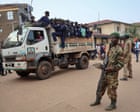
In a noteworthy development on the international stage, the United States has played host to a significant peace agreement between Rwanda and the Democratic Republic of the Congo (DRC). This accord, signed in Washington with the presence of notable U.S. political figures, seeks to bring an end to ongoing conflicts that have roots tracing back to the tragic events of the Rwandan genocide in 1994. The U.S. has highlighted its role in securing vital mineral rights from the agreement, painting a picture of strategic diplomacy interwoven with economic interests.
The orchestrated peace agreement was sealed under the observant eyes of the U.S. Secretary of State Marco Rubio and the enthusiastic facilitation of Donald Trump, who has long emphasized the strategic significance of African resources to the global economy. The central tenet of this accord is the withdrawal of Rwandan troops from eastern Congo, a region that has seen prolonged unrest. This move is expected to occur within 90 days, signaling a potential cessation of hostilities that could pave the way for stability and prosperity in the region.
While the accord has been met with cautious optimism, certain voices from the international community have expressed concerns over its ambiguous specifics. Critics point to the lack of clarity concerning the mechanisms of enforcement and the ultimate beneficiaries of this peace process. Nonetheless, the ceremonial signing has sparked hopes that decades of turmoil and conflict might finally find resolution.
In parallel with these African developments, tensions in the Middle East have seen calls for peace take center stage as well. Donald Trump has echoed powerful sentiments urging a ceasefire between Israel and Hamas. His statements, made via online platforms, stress the urgency of reaching a détente within a week to mitigate the escalating conflict and secure the release of hostages. The ongoing violence in areas like Khan Younis and Gaza City underscores the dire need for a ceasefire, with recent airstrikes tragically resulting in lost lives and deepening wounds on both sides.
Observers have noted that these efforts toward peace in multiple regions demonstrate a concerted attempt by the United States to rekindle its role as a mediator in global conflicts. Amid these negotiations, the economic impact of regional conflicts has also been observed, with fluctuations in fuel prices reflecting the ongoing instability. Discussions around these price changes further amplify the interconnectedness of global events and economic realities.
As the world watches these efforts unfold, there is a palpable sense of hope that through careful diplomacy and the fostering of cooperative dialogues, longstanding conflicts can edge toward resolution. The serene landscapes of Rwanda and the DRC, once marred by violence, and the historic arenas of the Middle East, weary from decades of strife, may yet find peace on the horizon.
Source: {link}
